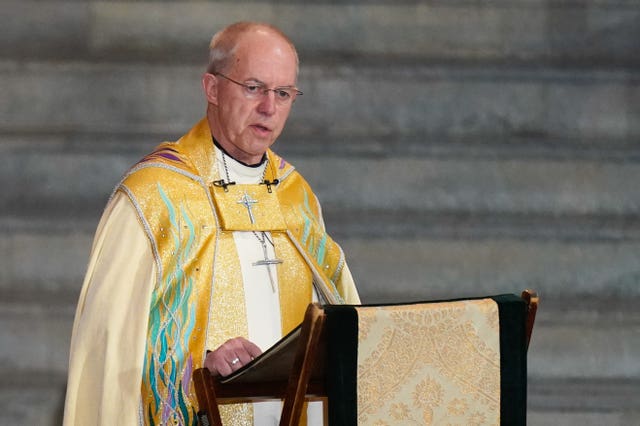Justin Welby: We have a moral responsibility on homes and housing
A new report calls on the Government to legislate for a body on housing, modelled on the Climate Change Committee.

The Archbishop of Canterbury is to call for an end to “short termism” in housing policy as a new report advocating decent homes across England is launched.
Justin Welby said problems with housing are “blighting the lives and futures of millions of people” and is insistent there is a “moral responsibility” to change this.
The Homes for All report, setting out a new vision for England’s housing system, is to be launched in the House of Lords on Tuesday.
The report calls on the Government to legislate for a body on housing, modelled on the Climate Change Committee which currently advises on emissions targets and reports to Parliament on progress made in reducing greenhouse gas emissions.
The housing body would independently scrutinise and provide the technical expertise needed to transform housing and housing policy in England, the report said.
Mr Welby said: “Everyone should have a home that is comfortable and safe, and in a thriving community where they can flourish.
“But for many people in England, home means something very different. It is somewhere that is often expensive or temporary, insecure or unhealthy.
“These problems are blighting the lives and futures of millions of people, and we all have a moral responsibility to put it right.
“We must end the short termism that is having a corrosive effect on our society and our economy.
“We can do this by agreeing a single vison of what a real home means and by creating a national housing body, akin to the Climate Change Committee, to help deliver that vision and transform England’s housing system.”

The report said the country currently lacks a “collective national vision” on housing policy, adding that “politicians and the public have no shared understanding of what good looks like”.
It said: “Far too many interventions have been designed to grab a short-term headline or deal with a very specific issue while failing to understand how they will impact on the rest of the housing system.
“Our report makes a compelling case that housing is a system not a single issue sitting in isolation. We need a systemic response, long-term thinking and implementation.”
The proposed Housing Strategy Committee would “provide technical expertise and robust scrutiny of government proposals to ensure they are consistent with the pursuit of our shared vision of a well-functioning housing market”, the report said.
It would also give “regular independent assessment of progress towards achieving the shared vision”.
The report has set out 25 key outcomes for England’s homes, housing market, housing system and housing policy.
These include that people should live in homes of high minimum standards that give them stability and security; have genuinely affordable decent housing choices in their lifetime; that housing should “complement other vital systems” such as healthcare, social care, finance and social security; and that various elements of the housing system such as the rental sector, construction and social housing should “work together rather than against each other”.
It said that the immediate priorities for the next parliament must be to deliver on the supply target of at least 300,000 new homes each year, making sure a maximum of 50,000 households are in temporary accommodation at any one time and improving affordability and quality standards of homes by the end of the parliament.
Interim Nationwide Foundation chief executive Samantha Stewart said: “Homes are the foundations for our lives. We need to stop fixing the cracks in this piecemeal fashion.
“By overhauling our housing system with a long-term vision, and the means to follow through on it, we can restore the solid base that our society is built on.”





